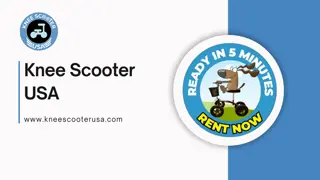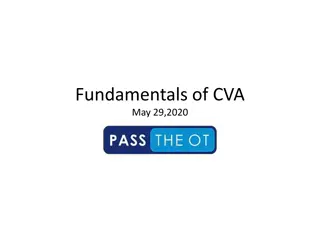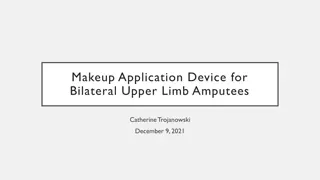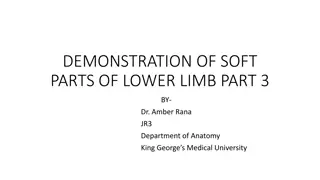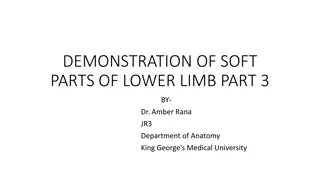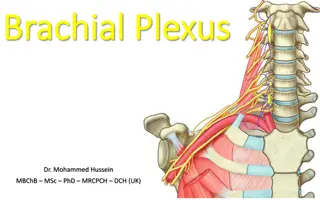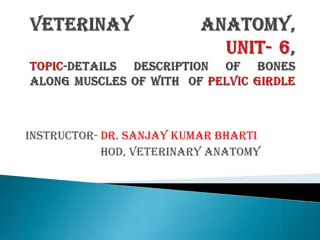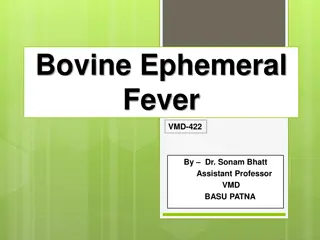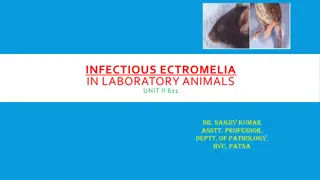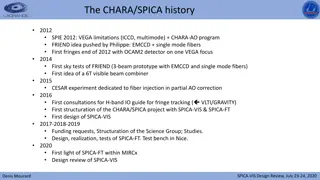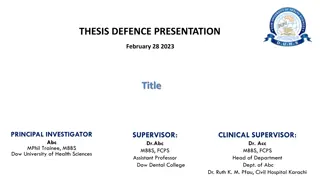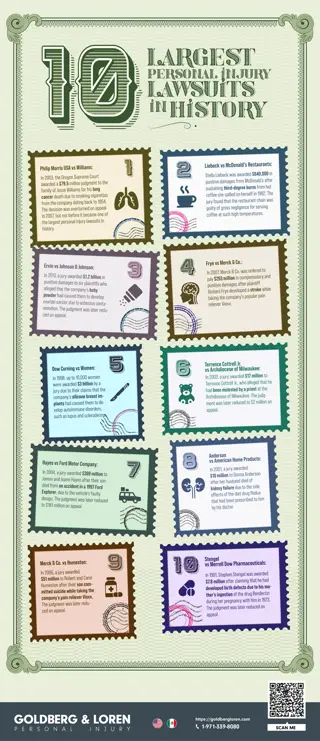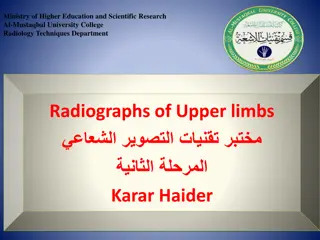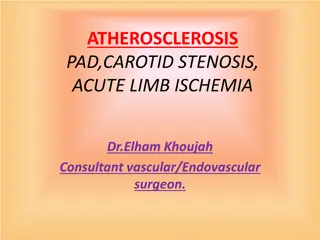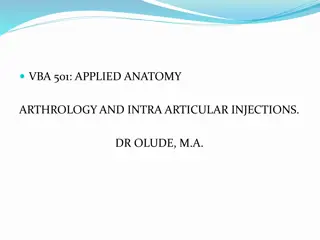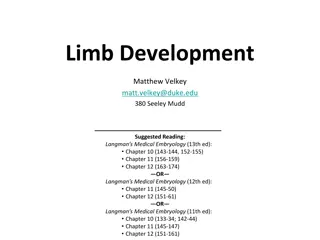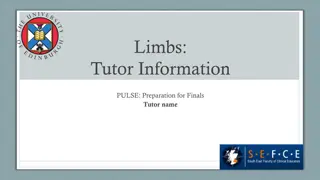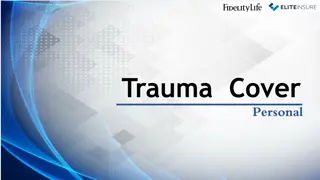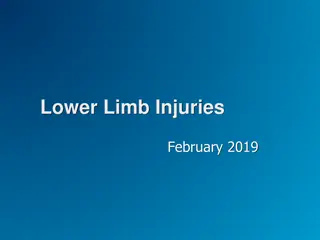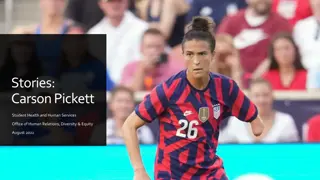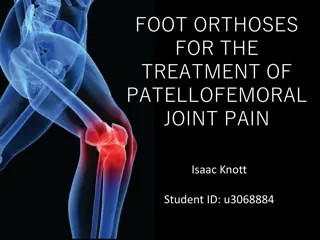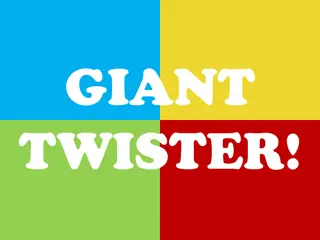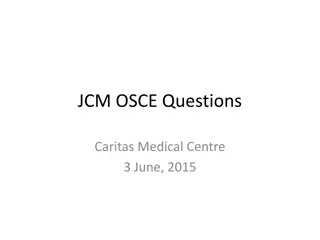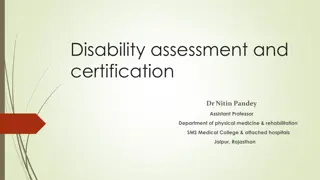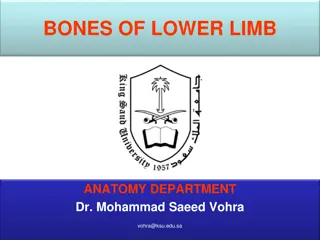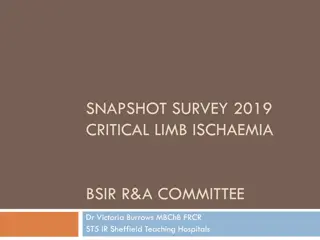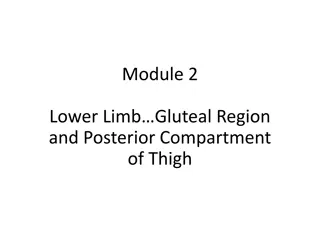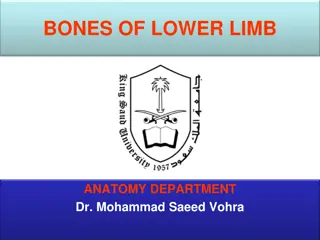Knee Scooters at Knee Scooter USA - Enhance Mobility Today
Knee Scooter USA offers high-quality knee scooters. Our knee scooters are ideal for anyone healing from a foot, ankle, or lower limb injury. They are robust, comfortable, and simple to use. Our dependable and cheap knee scooters will help you acquire mobility and freedom. Shop today and enjoy the be
1 views • 6 slides
Understanding Cerebrovascular Accidents (CVAs) and Their Effects
Learn about the fundamentals of CVAs, the common types - Ischemic and Hemorrhagic, left brain vs. right brain functions, effects on different brain hemispheres, and assessments and treatments for patients. Explore insightful questions related to post-CVA observations. The content also covers various
0 views • 17 slides
Innovative Makeup Application Device for Bilateral Upper Limb Amputees
Proposed solution entails a makeup application device designed for bilateral upper limb amputees, enabling independent makeup application. The device incorporates three components: an intermediary device, makeup brush end-effectors, and a change-out station/makeup case. Addressing the need for empow
0 views • 22 slides
Adaptation of Animals to Hot Climates - Understanding Thermal Regulation Strategies
Animals have evolved remarkable adaptations to cope with hot climates, including physiological responses such as sweating and changes in body size and limb length. Temperature stress can affect their functioning, making thermoregulation crucial. Bergmann's rule and Allen's rule explain how body size
0 views • 15 slides
Demonstration of Soft Parts of Lower Limb - Part 3 by Dr. Amber Rana at King George's Medical University
This presentation outlines the structures of the lateral compartment of the leg, posterior compartment of the leg, and dorsum of the foot. It includes information on boundaries, muscles, nerves, and vessels in each region, along with detailed descriptions of specific structures such as the peroneus
0 views • 15 slides
Demonstration of Lower Limb Soft Tissues - Part 3
This detailed demonstration by Dr. Amber Rana from King George's Medical University focuses on identifying and describing the structures of the lateral compartment of the leg, posterior compartment of the leg, and dorsum of the foot. It covers boundaries, muscles, nerves, and vessels present in each
0 views • 15 slides
Understanding the Brachial Plexus Anatomy and Function
The brachial plexus is a crucial network of nerves in the upper limb, formed by nerve fibers originating from C5 to T1 spinal levels. It plays a significant role in innervating the upper extremity muscles and providing sensory feedback. The plexus is categorized into roots, trunks, divisions, cords,
0 views • 55 slides
Understanding Pelvic Limb Anatomy: Bones and Muscles Overview
Bones and muscles of the pelvic limb, including the pelvis, thigh, leg, and foot, are detailed in this informative content. It covers the general designations of pelvic bones, descriptions of bones along with muscle attachments in various animals, and specifics about the hip bone structure and forma
1 views • 15 slides
Anatomy of the Upper Limb: Clavicle, Scapula, Humerus
The upper limb anatomy includes detailed descriptions of the clavicle, scapula, and humerus bones. The clavicle is a long bone that articulates with the sternum and scapula, while the scapula lies on the posterior chest wall and has important bony landmarks like the acromion and glenoid cavity. The
2 views • 15 slides
Understanding the Electrical Activities of the Heart - An Overview
The electrocardiogram (ECG) is a result of intricate physiological and technological processes involving transmembrane ionic currents, cardiac activation sequences, and electrode connections. The cardiac conduction system consists of various components like the sinoatrial node, atrioventricular node
0 views • 39 slides
Understanding Upper Limb Deep Tendon Reflexes Examination
Exploring the intricacies of upper limb deep tendon reflexes (DTR) examination, this comprehensive guide elaborates on the monosynaptic stretch reflex mechanism, protective role of stretch reflexes, grading of reflexes, factors influencing reflex activity, and reinforcement techniques like the Jendr
0 views • 28 slides
Addressing Podoconiosis: Challenges and Achievements in Ethiopia
Footwork initiative aims to eliminate podoconiosis by integrating prevention and treatment efforts, partnering with public and private sectors. Podoconiosis is characterized by lower limb lymphedema and affects areas with red clay soil exposure. Activities include health professional training and ad
0 views • 6 slides
Understanding Bovine Ephemeral Fever: Key Information and Insights
Bovine Ephemeral Fever, also known as Three-Day Sickness or Three-Day Fever, is an economically important arboviral disease affecting cattle and water buffalo in tropical and semitropical regions. It is caused by an arthropod-borne rhabdovirus and primarily transmitted by mosquitoes and biting midge
0 views • 19 slides
Understanding Ischaemia-Reperfusion Injury: Implications in Disease
Ischaemia-reperfusion injury (IRI) is a critical event involving cellular changes due to the disruption and subsequent restoration of blood supply. This process can lead to necrotic and apoptotic cell death, contributing to conditions such as heart attacks, strokes, and cancer. Dr. Ben Allsop's rese
0 views • 6 slides
Understanding Infectious Ectromelia in Laboratory Animals
Infectious Ectromelia, also known as Mousepox, is a viral disease causing high mortality in adult mice and limb amputation in surviving cases. It is characterized by skin lesions, rash, and generalized fatal disease. Various strains of the virus exist, with transmission occurring through abrasions o
0 views • 16 slides
Development of CHARA/SPICA Project for Stellar Astrophysics Research
CHARA/SPICA project history spans from funding requests to the realization of SPICA instruments, including SPICA-FT and SPICA-VIS. Scientific requirements focus on stellar physics, visible interferometry, and large surveys for stellar parameters determination, with detailed specifications for fringe
0 views • 6 slides
Study on Work-Related Musculoskeletal Disorders and Median Nerve Entrapment in Upper Limb
Investigating the prevalence, factors, and treatment options for work-related musculoskeletal disorders, focusing on median nerve entrapment in the upper limb. The study aims to provide insights into this condition through a thorough literature review and research objectives.
1 views • 31 slides
10 largest personal injury lawsuits in history - Goldberg & Loren
Ever wondered how much a life, a limb, or a lifetime of suffering is worth in the eyes of the law? Dive into the world of record-breaking settlements and jaw-dropping verdicts with our infographic, exploring the 10 largest personal injury lawsuits ev
1 views • 2 slides
Understanding Perfusion and Wound Care Assessment
This comprehensive presentation delves into the critical aspects of perfusion and wound care assessment, covering topics such as tissue oxygenation, measuring tissue perfusion, diagnostic testing for critical limb ischemia, and techniques like ankle and toe systolic pressure measurement and transcut
0 views • 19 slides
Radiology Techniques for Upper Limb Imaging at Al-Mustaqbal University College
Explore radiographic imaging techniques for upper limbs including fingers and thumbs at the Radiology Techniques Department of Al-Mustaqbal University College. Learn about PA, lateral, oblique, and AP views for detailed analysis. Proper positioning and imaging guidelines are provided to ensure accur
0 views • 20 slides
Understanding Atherosclerosis, Peripheral Artery Disease, and Carotid Stenosis
This informative content details the histo-anatomy of blood vessels, pathophysiology of atherosclerosis, peripheral ischemia, and carotid artery disease. It covers the definition, risk factors, and processes involved in atherosclerosis, including endothelial cell function, blood flow dynamics, and f
3 views • 24 slides
Advanced Analysis of SAGE III Limb Scatter Retrievals
The proposed effort focuses on enhancing LaRC operational retrieval codes for SAGE LS data, correcting Level 1 radiances, and recommending LS operational scenarios. OMPS LS retrieval algorithms for aerosol and ozone, as well as the SAGE/M3 LS ozone retrieval approach, are detailed. Out-of-field stra
0 views • 12 slides
Vascular Team Approach in Unstable Angina with Complex Vascular Disease
A 73-year-old patient with COPD, hypertension, and hyperlipidemia presents with severe lower extremity ischemia, leading to a plan for urgent aorto-bifemoral bypass. The clinical examination and test results revealed critical limb ischemia and extensive vascular disease requiring intervention from c
0 views • 19 slides
Overview of Joint Anatomy and Injections by Dr. Olude
Dr. Olude presents a comprehensive guide on applied anatomy, arthrology, and intra-articular injections. The content covers types of joints, classifications of synarthroses, diarthroses, and amphiarthroses, as well as thoracic limb articulations and important bones and joints of the forelimb. Detail
0 views • 28 slides
Development of Limbs: From Initiation to Bone Formation
Limb development begins in the fourth week of embryonic development, with limbs forming from paraxial and lateral plate mesoderm. The process involves mesenchyme condensation, chondrocyte differentiation, and endochondral bone formation. Limb defects can occur, affecting approximately 1 in 200 live
0 views • 28 slides
Exploring Polydactyly and Syndactyly: Genetic Anomalies in Limb Development
Polydactyly is a condition characterized by the presence of more than five fingers or toes on a hand or foot, often associated with genetic disorders. This study delves into the types, patterns, associated anomalies, treatment plans, and outcomes related to polydactyly. Syndactyly, on the other hand
0 views • 23 slides
Neurological Assessment Essentials for Upper and Lower Limb Function
Learn about the motor and sensory nerve roots essential for evaluating upper and lower limb function, limb reflexes, and pathways of sensation. Understand key differences between UMN and LMN signs, common viva questions, and tips for preparing for finals.
0 views • 43 slides
Understanding Trauma Cover Benefits and Key Facts
Trauma Cover provides a lump sum payment for specified conditions like stroke, cancer, limb loss, and heart attack. It ensures financial security in case of devastating events. Optional benefits can be added for additional premiums. Key facts include coverage details, age limits, and maximum coverag
0 views • 29 slides
Morphology, Habitat, and Habits of the Frog - A Study on Amphibia
The frog, belonging to the genus Rana in the family Ranidae, is a cold-blooded amphibian found near water bodies. Its skin needs to be kept moist for respiration, and it undergoes hibernation in winter and aestivation in summer. The body is bilaterally symmetrical with distinctive features like a br
0 views • 5 slides
Snake Bite Management Guidelines: Reassurance, Immobilization, Hospital Care
Snake bite management involves reassuring the victim, immobilizing the affected limb, and promptly transporting the individual to a hospital with snakebite treatment facilities. Local and systemic examinations are essential to assess the severity of envenomation, followed by necessary investigations
0 views • 12 slides
Lower Limb Trauma: Injuries and Management Overview
This collection of images and descriptions covers common lower limb injuries, such as neck of femur, femoral fractures, and knee injuries. It provides insights into the assessment, treatment, and potential complications associated with lower limb trauma, emphasizing the importance of prompt evaluati
0 views • 38 slides
Inspiring Story of Carson Pickett: Breaking Barriers and Making History
Carson Pickett, a talented soccer player born with a congenital limb difference, has overcome challenges to excel in sports. Her viral moments and groundbreaking achievements, such as playing for the US Women's National Team, showcase her resilience and determination in promoting inclusivity and ada
0 views • 15 slides
Foot Orthoses for Treatment of Patellofemoral Joint Pain
Foot orthoses are custom-designed devices used in treating patellofemoral joint pain by correcting foot posture and improving lower limb biomechanics. They are prescribed as part of conservative management to reduce pain during activities like walking, running, and squatting. Physiotherapists often
0 views • 20 slides
Fun and Exciting Giant Twister Game with Colorful Twists
Enjoy a lively game of Giant Twister with a unique twist of colorful hands and feet placed on the mat. Spin around, stand up, and reach for the right combinations of hands and feet in this oversized version of the classic game. With images depicting each color-coded limb placement, get ready for a f
0 views • 48 slides
Clinical Case Study: Management of Thyrotoxic Periodic Paralysis
A 30-year-old man presents with bilateral lower limb weakness, weight loss, and abnormal ECG findings consistent with thyrotoxic periodic paralysis. The diagnosis, management steps, precipitating factors, and prophylactic medication are discussed. Additionally, a case of a 45-year-old chronic drinke
0 views • 48 slides
Disability Assessment and Certification Guidelines by Dr. Nitin Pandey
Disability assessment involves evaluating impairments and functional limitations to determine disabilities, especially in the context of locomotor disabilities. Dr. Nitin Pandey outlines the criteria for certification, highlighting factors like muscle strength, joint motion, coordination, stability,
0 views • 37 slides
Anatomy of Lower Limb Bones: Thigh (Femur and Patella) Overview
Explore the detailed anatomy of the bones in the lower limb, specifically focusing on the thigh bones - the femur and patella. Learn about the structure, function, and key features of these bones, including their articulations, surfaces, and attachments. Enhance your understanding of the classificat
0 views • 22 slides
Best Practices in Critical Limb Ischaemia Care Pathways
This collection of survey results and methodologies highlights the need for consistent and evidence-based care pathways for critical limb ischaemia. Dr. Victoria Burrows and the BSIR R&A Committee provide valuable insights to address pathway delays and improve patient outcomes.
0 views • 24 slides
Comprehensive Study of Lower Limb Anatomy and Function
Explore the detailed anatomy of the gluteal region, posterior compartment of the thigh, blood vessels, nerves, and muscles of the lower limb. Learn about dermatomes, communication areas, muscle actions, Trendelenburg gait, and more. This educational resource is part of a pedorthic program of study f
0 views • 14 slides
Lower Limb Bones Anatomy Overview
Explore the bones of the lower limb, including the femur and patella of the thigh. Learn about the structure and features of these bones such as the head, neck, trochanters, and shaft of the femur. Enhance your knowledge on the classification of bones in the thigh, leg, and foot regions, distinguish
0 views • 22 slides
